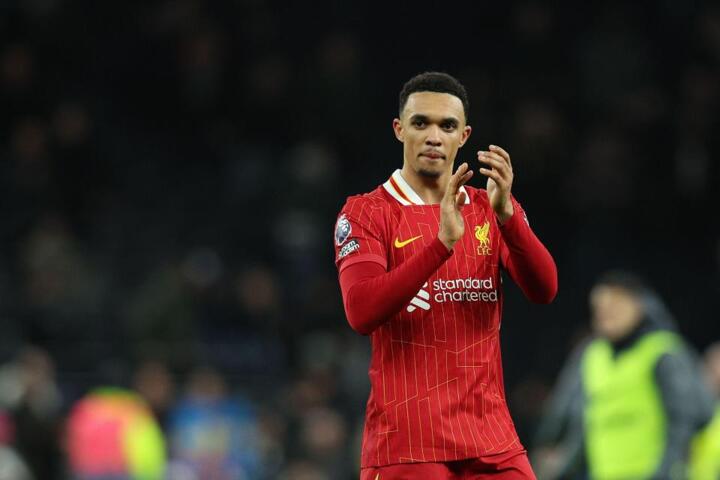TRENT ALEXANDER-ARNOLD to Real Madrid feels like a story as old as time.
The names and recruitment methods change, but the siren song of the Bernabeu remains the same.
And it's as powerful as ever.
From Laurie Cunningham – the first Englishman to play for the club in the professional era – to David Beckham, Jude Bellingham and Kylian Mbappe, the lure of the famous white shirt has often proven irresistible to the club's biggest stars for almost fifty years.
Some players have escaped the clutches of Real and their infamous president Florentino Perez.
Steven Gerrard, Alexander-Arnold's predecessor as Liverpool hero, revealed Real wanted him to “start a war” to force their way out of Anfield in 2010.
Not Gerard.
But others are at the mercy of forces beyond their control.
Luis Figo didn't actually want to leave Barcelona in 2000, but Perez's money and machinations made it happen.
And when someone wants to join Real as much as they want to sign him – as Spanish media representatives claim is the case at TAA – a deal feels all but inevitable.
Whether Liverpool fans like it or not, Real Madrid Club de Futbol is one of the few sporting institutions with a more glorious history and a more glamorous present than the Anfield club.
Through fifteen European Cups alone, Real emerged as the most successful club in football on its own merits.
And the financial power that comes from being one of the most recognizable brands in the world allows them to meet the salary expectations of the world's best players.
Yet Real's appeal goes beyond mere numbers.
They have an aura, a magic that has rarely diminished in an era when football has become a truly global game.
At various times, Manchester United and Barcelona were the favorite clubs for the crème de la crème.
But with both going through tough times, the Bernabéu is where players like Alexander-Arnold, 26, want to go.
And as Mbappe proved, when you're an in-demand talent, you can choose your own adventure. That was not the case when Cunningham left West Brom for Real in 1979.
Even if the England winger had not wanted to leave, the £950,000 offer was not something the Baggies would have been willing to turn down.
At the time, the big Spanish and Italian clubs could pay transfer fees and especially wages that were beyond the reach of most, if not all, English sides.
The 1995 Bosman ruling – which allowed players to leave the club at the end of their contracts without paying a transfer fee – changed the balance of power between clubs, players and agents.
Steve McManaman was the first major Premier League star to take advantage of the freedom to sign a pre-contract deal with a major foreign club when he agreed to join Real in 1999.
McManaman signed the deal in January but refused to pose in a white shirt out of respect for Liverpool.
But where necessary, Real – and Perez – have been willing to force the issue.
The club were Champions League champions when Perez ran against Lorenzo Sanz for the presidency in 2000.
Launching an aggressive new recruitment policy – starting with the signing of Figo from bitter rivals Barcelona – was his campaign promise.
So when Perez secured a surprise victory, Figo found himself crossing Spanish football's great chasm for a world record fee of £52 million rather than signing an improved deal at the Camp Nou.
It was the start of the Galactico era that saw Zinedine Zidane, Beckham and other big names come together in a star-studded squad.
Michael Owen and Jonathan Woodgate followed from the Premier League – they failed to meet the sky-high expectations, as did the trophy, and Perez left in 2006.
But since his return in 2009, Real have gotten a lot for their money.
Cristiano Ronaldo joined from Manchester United that summer for £80 million – a world record fee at the time – and became the greatest goalscorer in the club's history, scoring an impressive 451 goals in his 438 appearances in all competitions.
To keep Ronaldo busy, the £86 million Real paid Tottenham for Gareth Bale in 2013 was underreported.
But the overall message was clear: even as the Premier League's financial power continued to grow, Real could still find their man.
Luka Modric and Eden Hazard are just two other examples of star players who left England for Real.
The cash gap between LaLiga and the Premier League is why Perez continues to campaign for a European Super League.
In the meantime, he and chief scout Juni Calafat are pursuing a hybrid transfer policy.
Real quickly took action to sign young talent like Vinicius Jr. with a deal months before he turned 18 in 2018.
Endrick was just 16 when he signed a deal to move to the Bernabeu when he turned 18 last summer.
Calafat is also eyeing experienced top-level players who are available for free, such as Antonio Rudiger and David Alaba.
And when big money has to be spent on the hottest talent, Real spend it, as they did last year when they initially shelled out £88.5m for Bellingham.
However, it is significant that other clubs – including Liverpool – could have matched that amount and the young England star's financial package. But Bellingham wanted Real.
Last summer, one of the most boring transfer sagas in football history ended when Mbappé finally joined Real.
The 26-year-old France captain resisted Paris Saint-Germain's attempts to transfer him to Saudi Arabia and let his contract expire before moving to the Bernabeu on a £128 million fee, payable over five years on top his £13 million annual contract. salary.
Then again, a handful of other clubs might have been able to make a similar deal.
But Mbappé was determined to put on that famous white shirt.
If Alexander-Arnold is of the same opinion, Liverpool can do little or nothing to prevent this.
